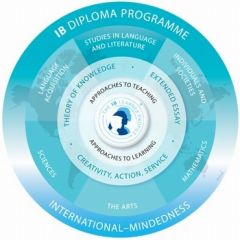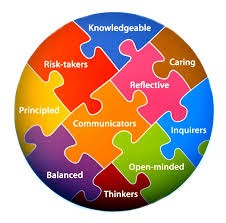What's IB Diploma
What is the International Baccalaureate’s Diploma Programme?
After students graduate from the Middle Years Programme by December of year 10, they enter the Diploma Programme, which they take in the remaining year 10 and years 11 and 12.
The International Baccalaureate’s Diploma Programme was the first programme offered by the IB. It was established in 1968 and by November 2022 there were over 5,500 schools offering the IB across 160 countries in the world. The DP was established with the aim of providing students with a balanced education, facilitating geographic and cultural mobility and promoting international understanding.
The Diploma Programme is a rigorous two-year course with the aim of preparing students for higher education and life in a global society. By offering the DP here at Tamagawa we are able to develop students who
- have excellent breadth and depth of knowledge
- flourish physically, intellectually, emotionally and ethically
- study at least two languages
- excel in traditional academic subjects
- explore the nature of knowledge through the programme’s unique Theory of Knowledge course.
When choosing their subjects to study in the Diploma Programme, students build on the knowledge and interest they have gained from their subjects in the Middle Years Programme. Following advice from teachers, the college counsellor and their parents, choose 6 subjects, some of which will shape their subject choice at university and future careers.
Questions and Answers
How does the Diploma Programme fit into the International Baccalaureate’s programmes?
The International Baccalaureate offers 4 courses.
- The Primary Years Programme (PYP) is for students aged 3-12.
- The Middle Years Programme (MYP) is for students aged 11-16
- The Diploma Programme (DP) is for students aged 16-19. The DP is after the age of compulsory education.
- The Career Programme (CP) is for students aged 16-19.
Is the Diploma Programme recognised by universities around the world?
Yes!
- Students are working towards getting a Diploma which is a qualification recognised and respected by top universities throughout the world.
- The Diploma can be used to get into universities in many countries such as Japan, America, Canada, Australia, New Zealand and The United Kingdom.
- The Diploma was officially recognised by MEXT in 1979. Admission requirements are left up to each individual university.

What subjects are offered in the Diploma Programme?
- Group 1: Studies in Language and Literature
- Group 2: Language Acquisition
- Group 3: Individuals and Societies
- Group 4: Sciences
- Group 5. Mathematics
- Group 6: The arts
Students can choose one course from each group on the Diploma Programme model.
or:
- Two group 1 courses, meaning they can’t choose a group 2 subject.
- If a student doesn’t want to take a group 6 course, they may select an additional course from Group 3 or 4.
Students must choose 3 Standard Level (SL) courses, 150 teaching hours and 3 Higher Level courses (HL), 240 teaching hours.
All students must do the core of TOK, EE and CAS.
What subjects are offered at Tamagawa Academy?
Group 1:
- English A: Language and Literature (SL and HL)
- Japanese A: Literature (SL and HL)
- Mandarin A: Language and Literature (SL and HL)
Group 2:
- English B (SL and HL)
- Japanese B (SL and HL)
- Mandarin B (SL and HL)
Group 3:
- Economics (SL and HL)
- History (SL and HL)
- Environmental Systems and Societies (SL only)
Group 4:
- Biology (SL and HL)
- Chemistry (SL and HL)
- Physics (SL and HL)
- Environmental Systems and Societies (SL only)
Group 5:
- Mathematics: applications and interpretation (SL only)
- Mathematics: analysis and approaches (SL and HL)
Group 6:
- Visual Arts (SL and HL)
- Film (Offered as an online course at SL only)
What is the core of the Diploma Programme?
You can find out about the Core of the Diploma Programme by clicking here.
What kind of assessments do students take?
Students are assessed through examinations at the end of the course. As well as examinations, each course has its own range of assessments, which include investigations, experiments, oral work, essays and presentations. For a breakdown of the subjects offered for each subject, please click on the syllabus link here.
How can a student pass the Diploma?
- Each of the 6 subjects is graded out of 7.
- TOK and the Extended Essay are graded from A-E together and can give 3 bonus points. Students must get at least a “D” in TOK and The Extended Essay in order to pass the Diploma.
- The maximum points total is 45. Students must get a minimum of 24 points to get the Diploma.
- Within the minimum score of 24, students must get at least 12 HL points and 9 SL points.
- Students can’t get a grade 1, three grade 2s or four grade 3s.

Is the Learner Profile still important in the Diploma Programme?
Yes. The Diploma is not just about academic success, students are still given the opportunity to meet the 10 Learner Profile attributes. Students are given Learner Profile awards at the monthly IB Assemblies as well as at the end of year graduation ceremony.
How is awareness of International Mindedness raised in the Diploma Profile?
International Mindedness is important in the Diploma Programme. Students are encouraged to learn about what is happening in the world around them both inside and outside of the classroom. Year 11 choose International Mindedness representatives who keep their fellow students up to date with events happening worldwide, through the International Mindedness Board and IB Assemblies. Tamagawa Academy is a Super Global High School, which gives students a wide range of opportunities such as going to guest speaker events and meeting exchange students. Students also have the opportunity to engage in events through Round Square and The Model United Nations. Our year 12 students are currently building links with a school in Derbyshire, England.
How are students supported through Academic Integrity?
Students are given academic integrity workshops through their DP Core class. The information given to students in their Academic Integrity guide is reinforced by teachers in their classes. The International Baccalaureate’s philosophy on Academic Integrity is shared with all staff, parents and students in workshops throughout the year. Every time students hand in an assessment they are also required to hand in an Academic Integrity form. The school runs all student work through Turnitin.com
How are students with special education needs supported?
The Tamagawa Academy IB Programs recognizes and supports making the Diploma programmes accessible to the broadest possible range of students. The IB Programmes is committed to provide an adaptable, positive, safe learning environment that appropriately strives to meet learners’ needs and that encourages all learners to achieve their fullest learning potential.
The IB offers a range of provisions for students who may have Special Educational needs, including additional time in exams, assessments, or changes to the exam room environment. Tamagawa Academy works closely with parents of students who would benefit from the provision offered by the IB.






